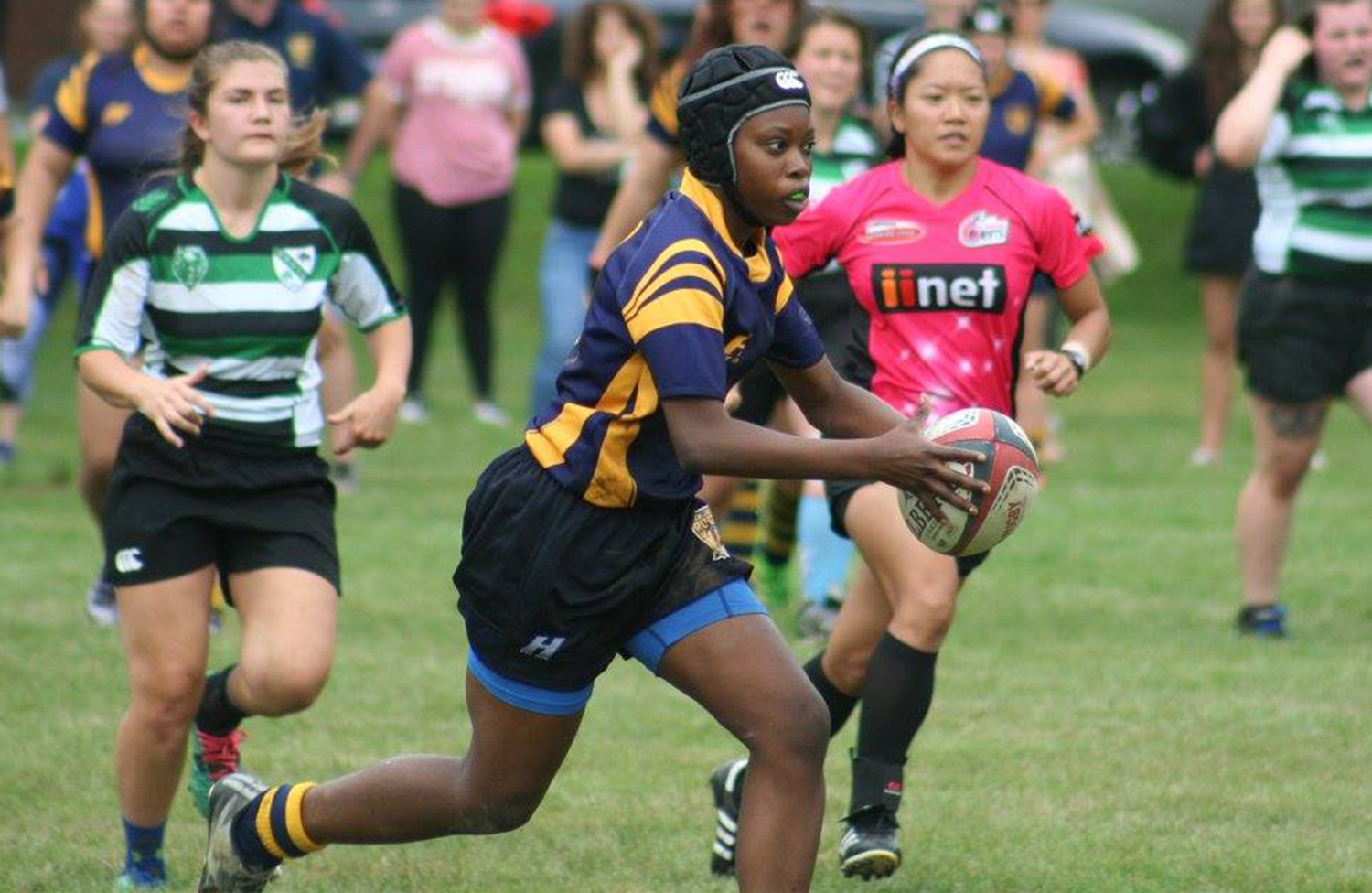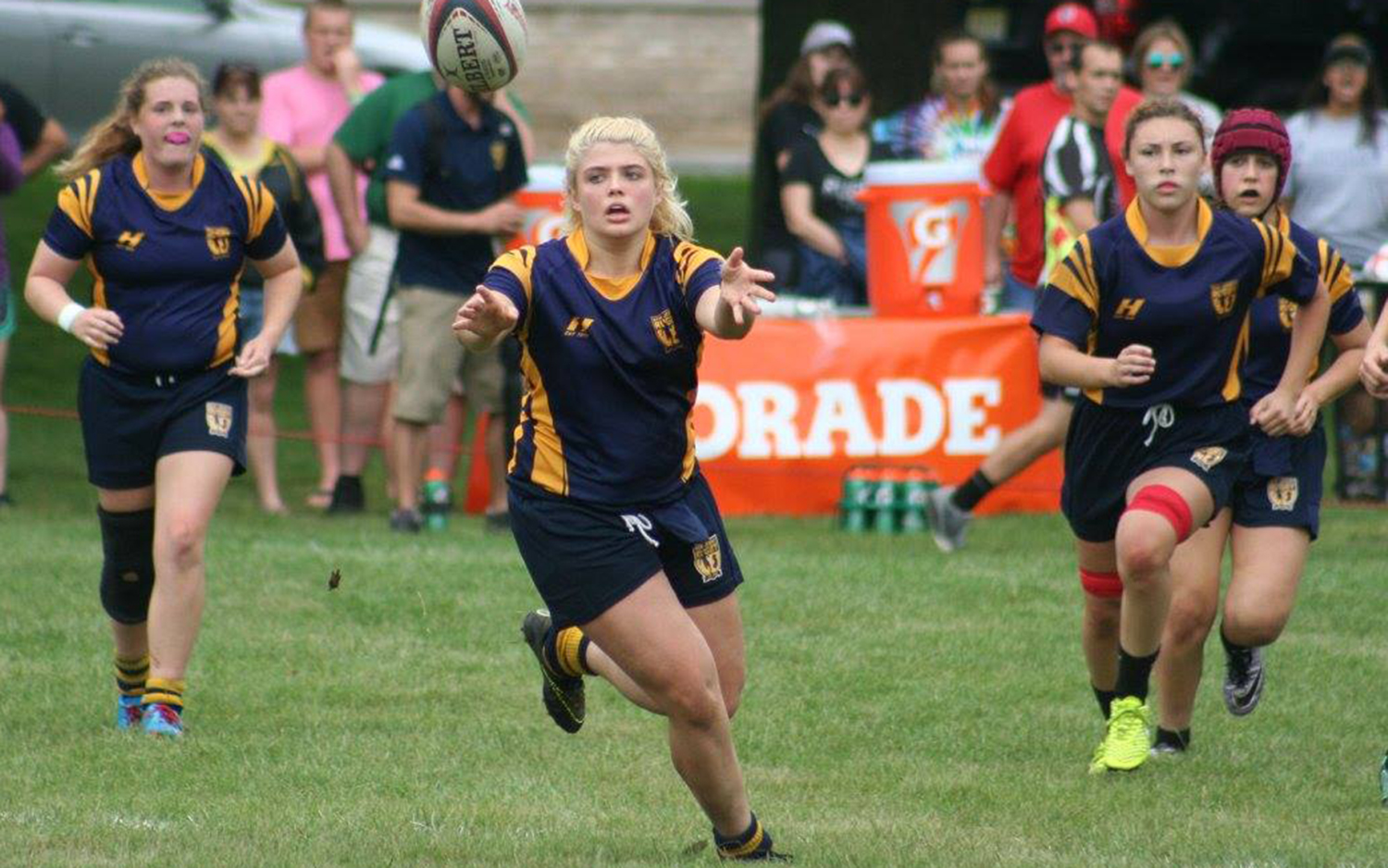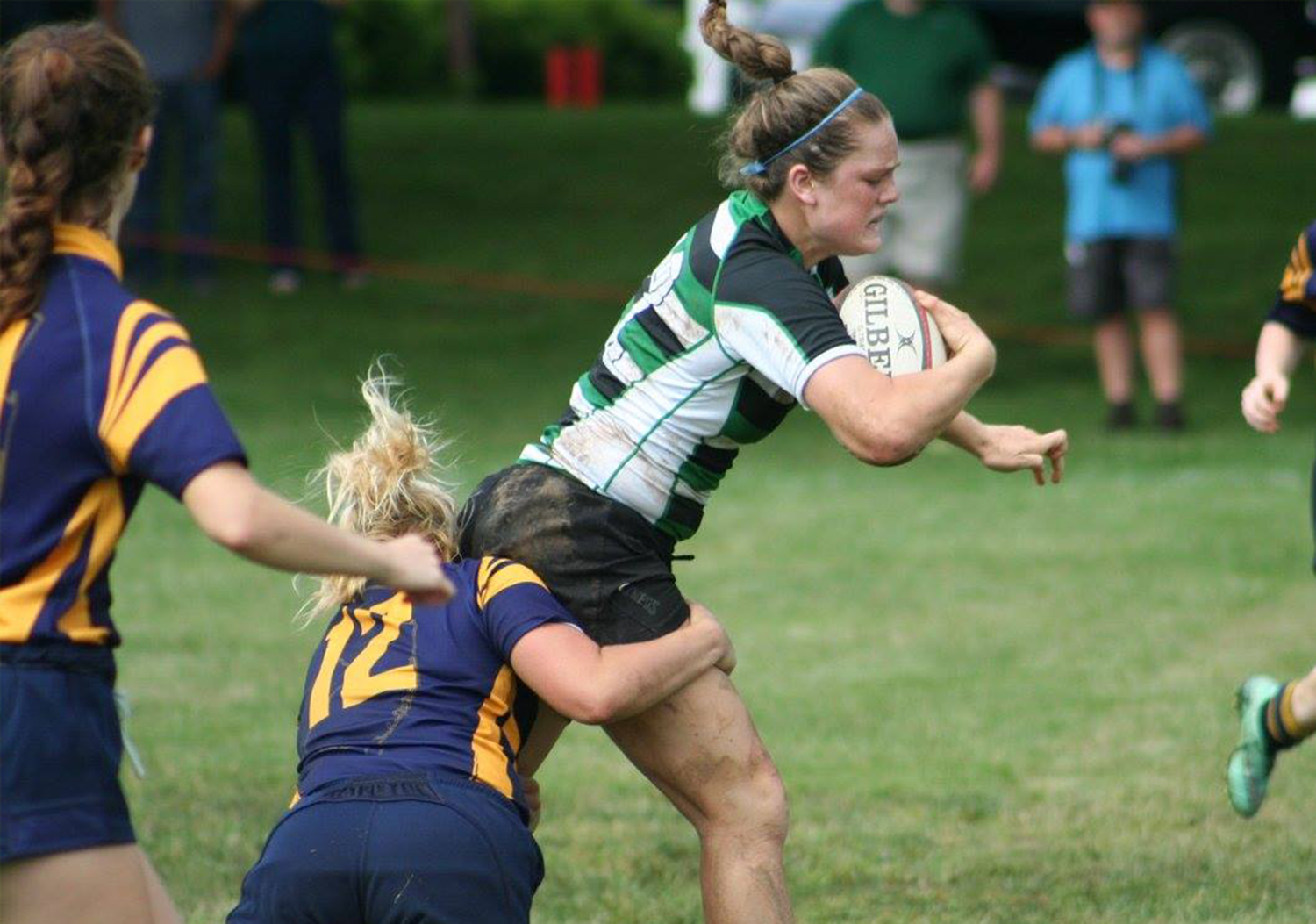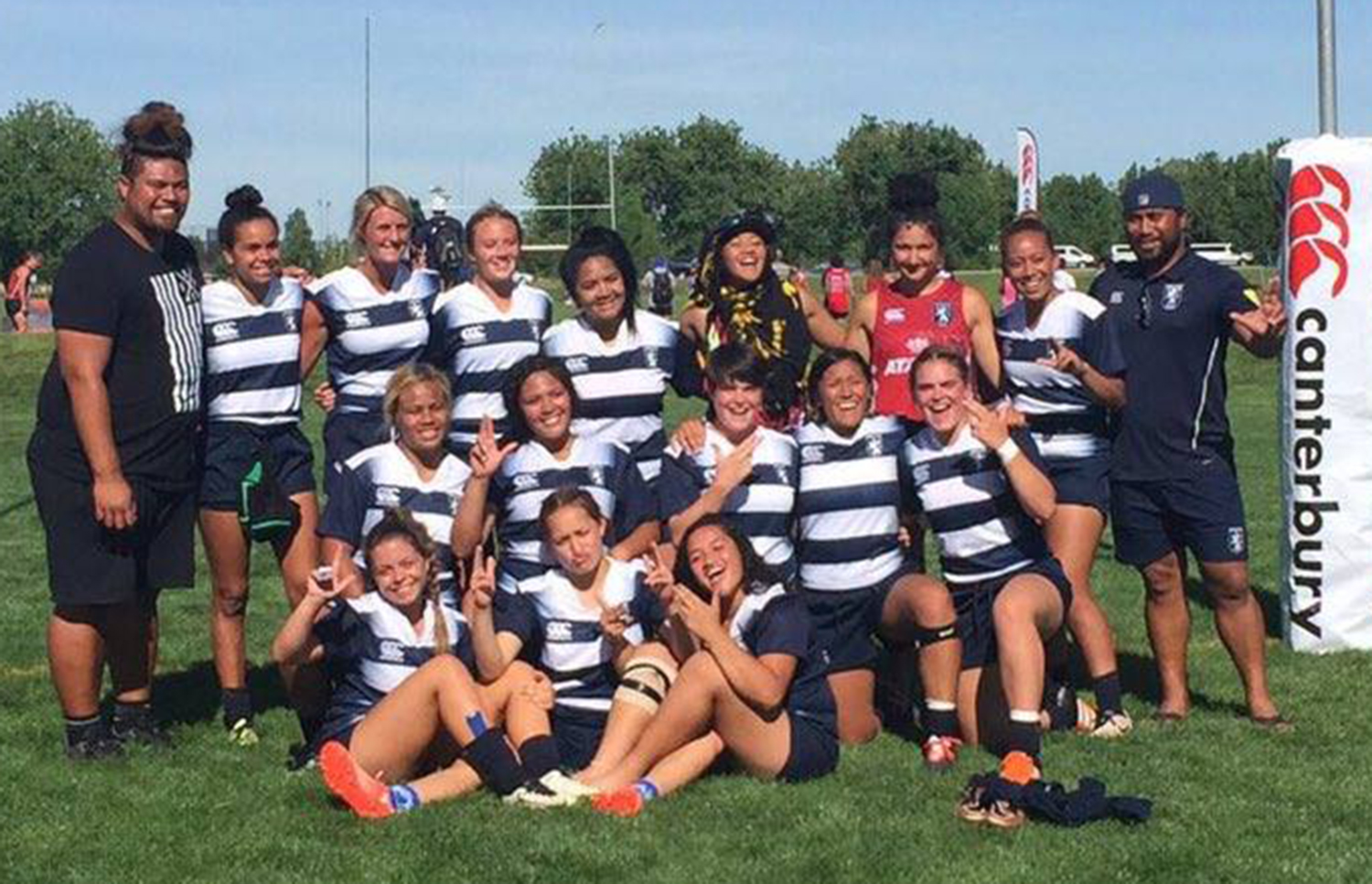
New Jersey photos: Diane Ramage
The Regional Cup Tournaments (RCTs) accentuate the variety of girls’ high school all-star programs in play. Between the Northeast and West RCTs, the varsity and JV fields featured teams that pulled players from multiple states; represented a single city or division within an SRO; had athletes who primarily play 7s (RCTs are 15s); and also serve as an academy. Nonetheless, rugby was played, scouts took notes, and champions were named.
RELATED: Northeast RCT Preview • West RCT Preview • Girls’ HS All-Star Rosters
The Northeast tournament wasn’t the event it was last year, as 2016 participants either didn’t field a team (Massachusetts) or opted for a less restrictive all-star event (read more). RCT host Rugby New Jersey felt that depletion in its own ranks this year, as the girls’ high school division didn’t have the numbers for a 15s league and a proposal to play 10s was vetoed. The result was no girls’ high school state championship this year.
Morris head coach Gene Caulfield took over as head coach for the New Jersey all-stars. He scheduled three open practices in advance of selections and invited all state and New York City-area teams to attend. Play Rugby Academy and Union showed interest, and they contributed skilled athletes to a mostly Morris state team.
New Jersey captains No. 8 Jordan Cowan and scrumhalf Jess Nagie also captain Morris, so there was a level of familiarity there. Additionally, only three players were new to the squad, having picked up the sport this year, and many members knew each other from years of select side play. They’re friends, and they enjoy playing together.

“The part we tried to get across was that we play together as a team. There are no individuals,” Caulfield said. “And you saw that in the first couple minutes of our first game [against Connecticut]. From the opening kickoff, we went 8, 9, 10 phases before the referee blew the whistle for a penalty. They were gelling together right there.”
New Jersey defeated Connecticut 34-5. Wing Allie Mennella scored a brace of tries, but the rest of the points were spread around the pitch. Western New York took on Connecticut next and won 47-5.
“We knew that would be our toughest game. A bunch of their girls have been playing together for a while, too,” Caulfield looked toward the Lightening. “I was impressed with their size … but we played our game – played fast, moved the ball, counter-rucked. And we did those things well.”

New Jersey ran out to a 34-5 halftime lead, and then Western New York dotted down a couple more tries in the 39-17 final. Caulfield noted Lightening center Emily Henrich as a standout, and the Girls’ High School All-American accounted for three tries.
“It would have been nice to have a few more teams. It’s always interesting to see how you perform against other competition,” Caulfield said. “Two games is a little bit of a let-down. You want to play as many teams as you can.”
The mostly Morris squad moves into summer 7s now, and the team will play a couple of Empire series tournaments before the championship (Blazing 7s) as well as travel to Doylestown and Maryland to mix up the competition – similar to the 15s season.
The West RCT was better attended, drawing competition from as far as Oklahoma and Wisconsin to fill out two divisions. For Atavus Academy Utah, its main concerns came from within, as the team traveled with only 16 players and started day two with 13. Nevertheless, the academy went undefeated for the varsity title.
Player availability was influential in the academy’s preparation for the RCT. Head coach Orlando Pulou and staff anticipated a traditional attack from its opponents and implemented a defensive strategy to counteract it.
“Defensively, we focused on the technical aspect of our tackles – one chops and the other one comes over the top so we can control the contact area and where to poach or counter-ruck,” Pulou explained. “With limited numbers, we had no more than two in there, so we didn’t wear them out. We tried to run a blitz defense to make sure nothing got outside, but the girls did so well in the contact area and poaching that it didn’t get to that point.”
On attack, the staff introduced a 2-4-2 system, which redistributes forwards from around the breakdown into wider channels, allowing for more play with the backs and less chasing of rucks.
“We have some fast girls who might play in the backs for their home clubs but we had to implement them in the forward pack,” Pulou confirmed that he had the personnel to run such an attack. “McKay [Peisley], Addie [Sorenson], Liz Jeppson – they were in the forward pack and we usually had them on the outside 15-meter channel with the hooker. They had the skill set and speed and created mismatches.”

Photo courtesy Utah Rugby Academy
On day one, Atavus Academy Utah defeated Oklahoma 32-7 and Indy Speed 34-0. The team picked up two injuries in Delaney Rakuita and Lyn Alofipo, and a third teammate had to leave Saturday night.
“We asked the girls if they wanted to stick it out, and they said, ‘Let’s give it a try,’” Pulou said. “There was more cohesion; they were talking a lot. They did an amazing job playing as a team – not that they didn’t play as a team the day before.”
Pulou praised Wisconsin for playing a smart game and pressuring Utah’s outside attack. Captain Sorenson was key to a level game, recharging the squad during slumps and managing the emotions of younger players. Scrumhalf Aniya Matina made a big impact and connected well with flyhalf Sydnee Cervinski, new to the program this year. Front row and No. 8 Queenette Toomaletai from California stepped up her game and earned player of the match, while Ariana Moleni made a couple of try-saving tackles in the 15-12 win.
That confidence-boosting victory helped the team to a final 46-7 win over Colorado and West RCT title.
“They all did their jobs so well,” Pulou said. “The girls just wanted to play and that was evident on Sunday when we could have pulled out. I’m glad they said, ‘We came all this way and we want to play.’”
Atavus Academy Utah will also move into 7s now, heading to the Encinitas 7s in California and NAI 7s in Salt Lake City.
Wisconsin didn’t go home empty-handed. The JV team was far and away the best in its bracket, defeating Texoma, Colorado and Indy Speed by a combined 141-10 on day one, and Texoma 52-0 in the final. Last year, Wisconsin sent two teams to the South RCT and won both varsity and JV divisions. Across both the Northeast and West fields, Wisconsin looked strongest in terms of outfitting two squads that strictly adhered to eligibility requirements.
VARSITY
Atavus UT 32-7 Oklahoma
Atavus UT 15-12 Wisconsin
Atavus UT 34-0 Indy Speed
Atavus UT 46-7 Colorado
Wisconsin 45-5 Oklahoma
Wisconsin 36-0 Colorado
Colorado 22-17 Indy
Colorado 27-10 Oklahoma
Indy 31-14 Oklahoma
Indy 19-14 Wisconsin
JV
Wisconsin 42-5 Colorado
Wisconsin 47-0 Indy Speed
Wisconsin 52-5 Texoma
Colorado 34-15 Indy Speed
Indy Speed 29-22 Texoma
Texoma 26-15 Colorado
3rd: Colorado 52-5 Indy Speed
Final: Wisconsin 52-0 Texoma

